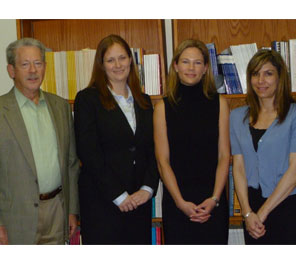 |
|
| UMass Medical School Law and Psychiatry faculty (from left) Thomas Grisso, Kimberly Larson, Laura Guy and Gina Vincent are applying forensic psychiatry and psychology to reform juvenile justice. |
Forensic psychiatry and psychology—disciplines in which scientific and clinical expertise are applied to legal issues—are essential in the juvenile justice system. “Get tough” laws that were passed by every state during the 1980s and 1990s, allowing juvenile offenders to be tried as adults, are being challenged by neuroscientific and behavioral research showing that adolescent offenders are not like adult offenders because their brains are still developing,
Today, the pendulum in the U.S. juvenile justice system is swinging back from punishment to treatment and rehabilitation as major reforms are underway in more and more states. “We’ve been very much a part of that,” said Thomas Grisso, PhD, professor of psychiatry and director of the Law and Psychiatry Program. “We develop tools, we test tools that already exist and we do the translation on the ground. We’re working in detention centers and in juvenile probation settings across the country.”
Dr. Grisso joined the Law and Psychiatry Program when it began in 1987. The program is an interdisciplinary network of UMMS faculty devoted to research, training and clinical services at the interface of psychiatry, behavioral science and the law.
With particular interests in juvenile justice, Grisso and colleagues Gina Vincent, PhD, associate professor of psychiatry, and Kim Larson, JD, PhD, and Laura Guy, PhD, both assistant professors of psychiatry, are dedicated to championing the mental health needs and legal rights of the youngest individuals in the justice system. Because two-thirds of boys and almost three-quarters of girls in juvenile detention centers have at least one mental disorder, early identification and effective interventions for untreated mental health needs can reduce a child’s risk of repeated involvement with the juvenile justice system.
Much of the team’s work involves the development of screening and assessment instruments that the juvenile justice system can use to identify kids’ needs for treatment and rehabilitation.“Half of our focus is on mental health in juvenile justice. The other half is on assessing kids’ risk of reoffending, and identifying their needs for interventions to prevent reoffending,” Grisso explained. “Our work is the equivalent of bench-to-bedside research, where the bench is the research we’re doing to take developmental theory and put it into a tool to do a job, and the bedside is us sitting in a detention center saying, ‘Here is how you put this tool in place and make it work.’”
The team’s efforts have been supported with significant funding from several sources, notably the John D. and Catherine T. MacArthur Foundation, which has committed more than $100 million to the MacArthur Foundation’s Models for Change: An Initiative for Juvenile Justice Reform over the past decade. The Law and Psychiatry Program’s National Youth Screening and Assessment Project (NYSAP) is a provider of technical assistance to help states change their juvenile justice systems for the MacArthur initiative.
Creating useful tools
In 1994,Grisso and colleagues developed the Massachusetts Youth Screening Instrument (MAYSI) to assist juvenile justice facilities in identifying youths, ages 12 to 17 years old, who may have special mental health needs. MAYSI is a reliable, low-cost, scientifically valid, 10-minute triage tool that can easily be administered by non-clinicians to every youth entering a juvenile detention or corrections facility. It is now the most widely used mental health screening tool in juvenile justice secure facilities in the United States. In addition to the tool itself, Grisso said “We provide a 40-hour-per-week help line for MAYSI users all over the country, and have just developed new software for it.”
Putting tools into action
Research that showed proper implementation is key to the effectiveness of MAYSI and similar tools led to the creation of NYSAP at UMass Medical School. Continuously funded by the MacArthur Foundation since 2000, NYSAP helps juvenile justice facilities around the country use MAYSI effectively.
NYSAP also focuses on risk assessment. “It’s important to identify youth who are at higher risk of reoffending, because you want to handle those differently from the vast majority of those who are not going to continue with crime,” explained Dr. Vincent, co-director of NYSAP. “This is another area where we’re translating science into the real world.”
Rewriting the law
Dr. Larson, an attorney with a PhD in clinical psychology, provides technical assistance to states that are in the process of developing juvenile competence-to-stand-trial legislation. “My interest is in how to make developmentally appropriate laws based on research rather than applying adult laws that often don’t make sense for kids,” she said.
“We’ve had a lot of success in a short period of time. Five states have passed legislation; we’re working with three to draft legislation, and expect bills will be passed in two of them this term. In total, we’ve worked with more than 20 states in various capacities,” Larson said. “After the law is in place, I often help them think about how to implement it, and how to start building services that may not exist in their states.”
Public-private partnership
Most recently, Dr. Guy was named principal investigator of a Models for Change project funded by an innovative private-public partnership launched by the MacArthur Foundation to maximize reform while stretching limited public dollars to support innovative and effective reforms in treatment and services for youth involved in the juvenile justice and child welfare systems. Her Risk and Mental Health Screening and Assessment of Youth Technical AssistanceDemonstration Project is co-funded by the federal government’s Office of Juvenile Justice & Delinquency Prevention. UMMS is one of four organizations selected for the project because they helped develop, field test and evaluate effective best practice models included in the Models for Change initiative.
As one of the newest members of the juvenile justice team, Guy shares credit for winning this grant with her juvenile justice colleagues. “A lot of mentorship and teamwork has led to our success in obtaining grants and opportunities,” she said.